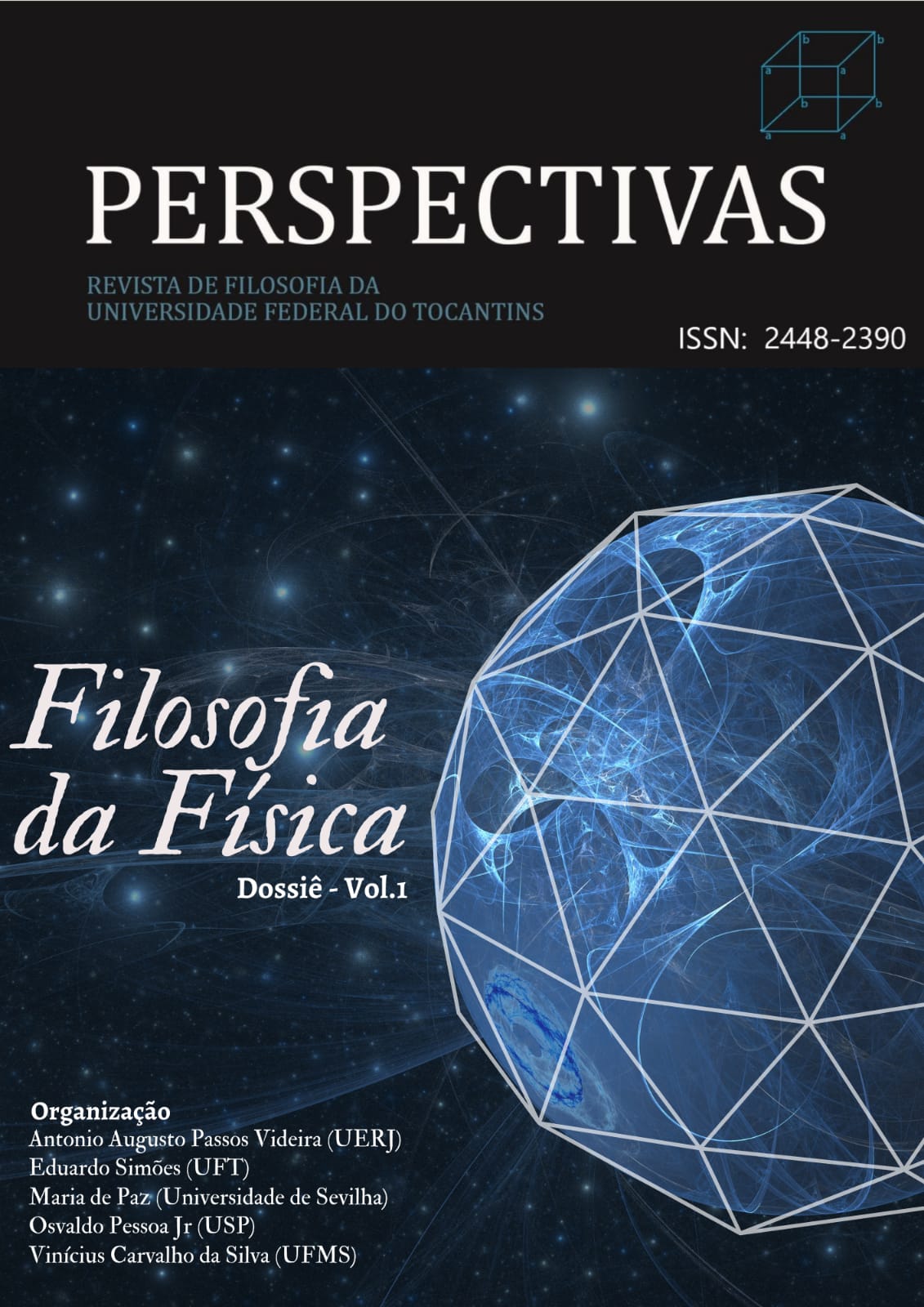Aspectos da indiscernibilidade quântica e da teoria de quase-conjuntos
DOI:
https://doi.org/10.20873/rpv7n2-45Resumo
A indiscernibilidade das entidades quânticas é considerada como uma das noções centrais das teorias quânticas. Neste artigo expositivo, são apontadas algumas das razões para essa alegada importância, bem como as ideias básicas de uma teoria matemática que permite tratar de coleções dessas entidades. O artigo inicia com uma posição geral do autor sobre a filosofia da ciência.
Referências
ARENHART, J. R. B. & KRAUSE, D. Why non-individuality? A discussion on individuality, identity, and car-dinality in the quantum context. Erkenntnis 79: 1-18, 2014.
DE BARROS, J. A., HOLIK, F. & KRAUSE, D. Contextuality and indistinguishability. Entropy 19 (9): 435-457, 2017.
DE BARROS, J. A., HOLIK, F. & KRAUSE, D. Distinguishing Indistinguishabilities: Differences Between Classical and Quantum Regimes. A aparecer.
DE BARROS, J. A., JORGE, J. P. & HOLIK, F. On the assumptions underlying KS-type contradictions. https://arxiv.org/abs/2103.06830, 2021.
DE SOUZA, E. G. Multideductive logic and the theoretical-formal unification of physical theories. Synthese 135: 253-262, 2000.
DOMENECH, G., HOLIK, F. & KRAUSE, D. Q-spaces and the foundations of quantum mechanics. Foundations of Physics 38: 969-994, 2008.
DOMENECH, G., HOLIK, F., KNIZNIK, L. & KRAUSE, D. No labeling quantum mechanics of indiscernible par-ticles. International J. Theoretical Physics 49: 3085-3091, 2010.
FALKENBURG, B. Particle Metaphysics: A Critical Account of Subatomic Reality. The Frontiers Collection. Berlin and Heidelberg: Springer-Verlag, 2007.
FRENCH, S. & KRAUSE, D. Identity in Physics: A Historical, Philosophical, and Formal Analysis. Oxford: Ox-ford Un. Press, 2006.
HACKING, I. Representing and Intervening: Introductory Topics in the Philosophy of Natural Science. Cam-bridge: Cambridge Un. Press.
HILBERT, D. Mathematical problems. Em BROWDER, F. E. (ed.) Proceedings of Symposia in Pure Mathemat-ics, 28. Providence: American Mathematical Society, pp.1-34, 1976.
HOLIK, F., JORGE, J. P. & Massri, C. Indistinguishability right from the start in standard quantum mechanics. https://arxiv.org/abs/2011.10903 , 2020.
HOLIK, F., JORGE, J. P., KRAUSE, D. & LOMBARDI, O. Quasi-set theory for a quantum ontology of properties. A aparecer, 2021.
KRAUSE, D. Is Priscilla, the trapped positron, an individual? Quantum physics, the use of names, and indi-viduation. Arbor 187 (747): 61-66, 2011.
KRAUSE, D. & ARENHART, J. R. B. The Logical Foundations of Scientific Theories: Languages, Structures, and Models. London: Routledge, 2017.
KRAUSE, D., ARENHART, J. R. B. & BUENO, O. The non-individuals interpretation of quantum mechanics. Em FREIRE JR., O, (ed), Oxford Handbook of the History of Interpretations of Quantum Mechanics, a aparecer, 2021.
MANIN, Y. I., Problems of present day mathematics: I (Foundations). Em BROWDER, F. E. (ed.) Proceedings of Symposia in Pure Mathematics, 28. Providence: American Mathematical Society, p.36, 1976.
MERZBACHER, E. Quantum Mechanics. 2nd. ed. New York: John Wiley, 1970.
NEY, A. The World in the Wave Function: A Metaphysics for Quantum Physics. Oxford: Oxford Un. Press, 2021.
SCHRÖDINGER, E. What is an elementary particle? Em SCHRÖDINGER, E. Science Theory and Man. London. George Allen and Unwin Ltd, pp. 193-223, 1967.
SCHRÖDINGER, E. Nature and the Greeks and Science and Humanism. Cambridge: Cambridge Un. Press, 1996.
SCHRÖDINGER, E. The Interpretation of Quantum Mechanics: Dublin Seminars (1949-1955) and other unpu-blished essays. Woodsbridge, CT: Ox Bow Press, 1995.
SUPPES, P. Axiomatic Set Theory. New York: Dover, 1972.
TELLER, P. Quantum mechanics and haecceities. Em CASTELLANI, E. (Ed.), Interpreting Bodies: Classical and Quantum Objects in Modern Physics. Princeton: Princeton Un.Press, pp. 114-141, 1998.
VAN FRAASSEN, B. To save the phenomena. The Journal of Philosophy 73 (18): 623-632, 1976.
WEYL, H. Philosophy of Mathematics and Natural Science. Princeton: Princeton Un. Press, 1949.
Downloads
Publicado
Como Citar
Edição
Seção
Licença
Copyright (c) 2023 Décio Krause

Este trabalho está licenciado sob uma licença Creative Commons Attribution 4.0 International License.
Os autores que publicam com esta revista concordam com os seguintes termos:
1. Autores mantêm os direitos concedidos à revista ou o direito de primeira publicação com o trabalho licenciado à Atribuição de Licença Creative Commons Atribuição 4.0 Internacional (CC BY 4.0) que permite o compartilhamento de trabalhos com reconhecimento de autoria e publicação inical nesta revista.
2. Autores têm permissão para aceitar contratos, distribuição não exclusiva da versão do trabalho publicada nesta revista (por exemplo, publicarem em repositório institucional ou como capítulo de livro) com reconhecimento de autoria e de publicação inicial nesta revista.
3. Autores têm permissão e são estimulados a publicar e distribuir o seu trabalho on-line (por exemplo, em repositório institucional ou em sua página pessoal) com as devidas referências à revista.





















